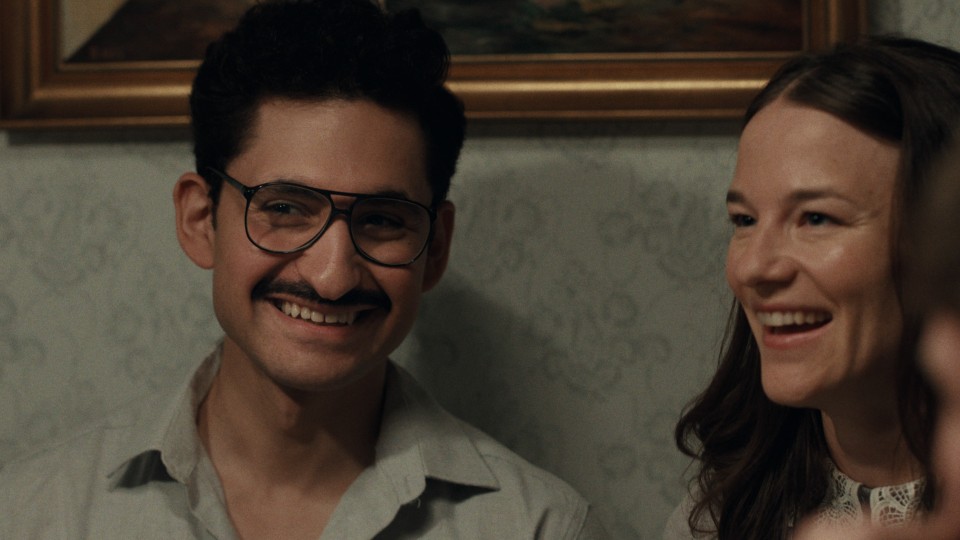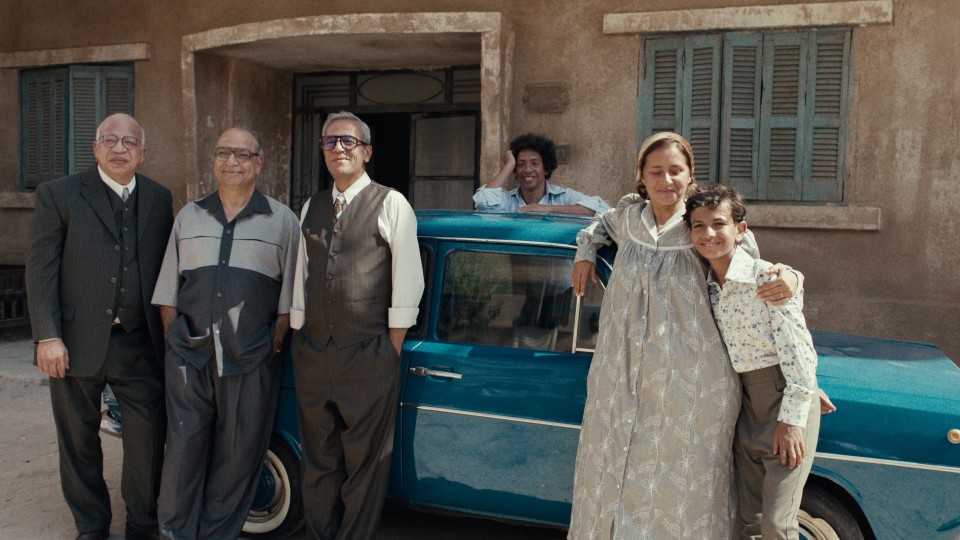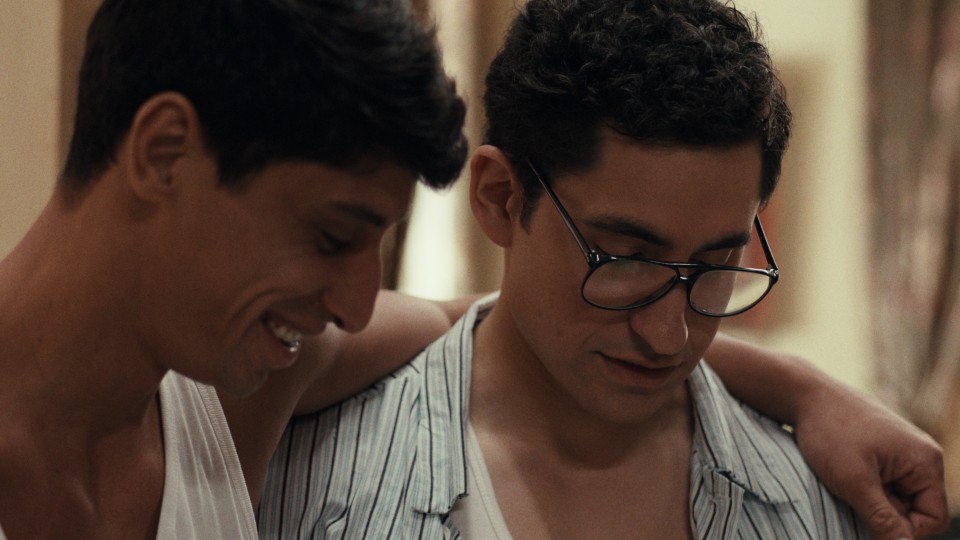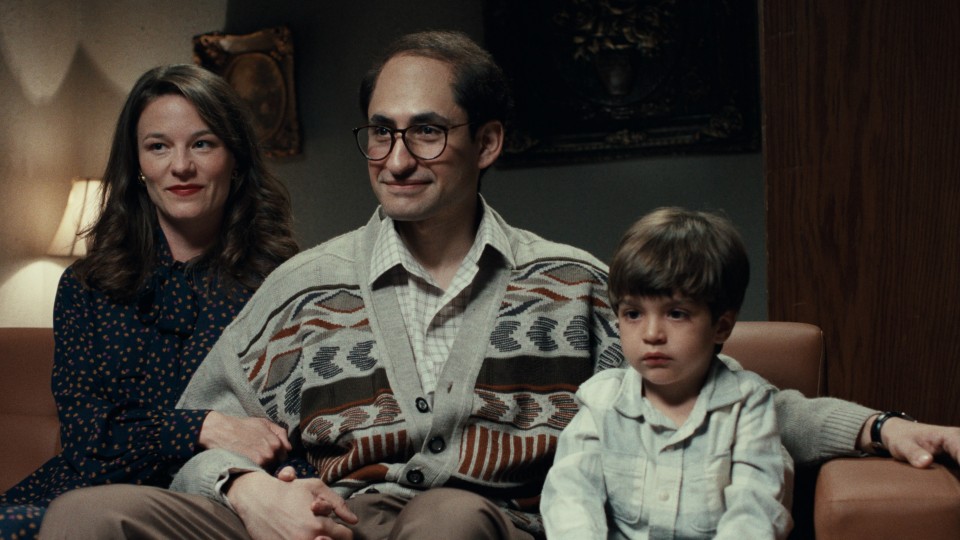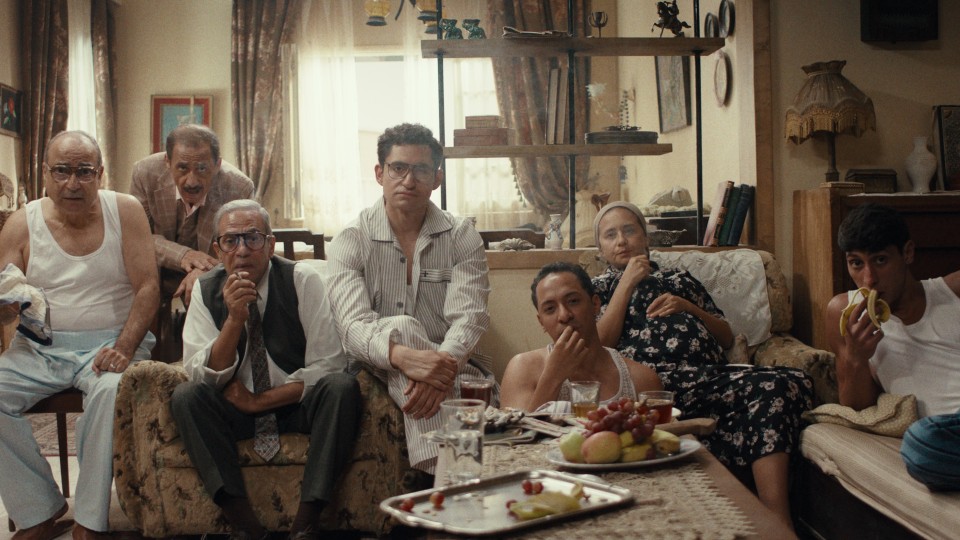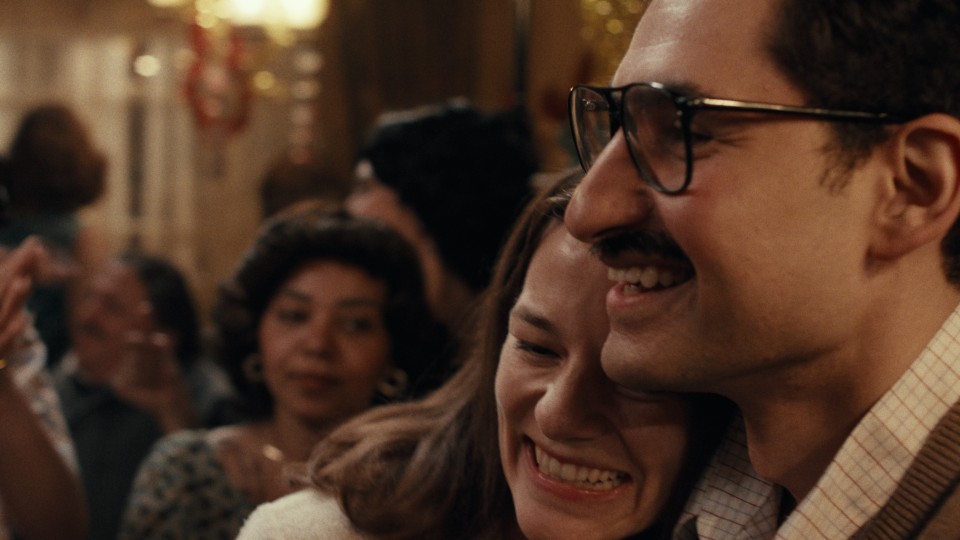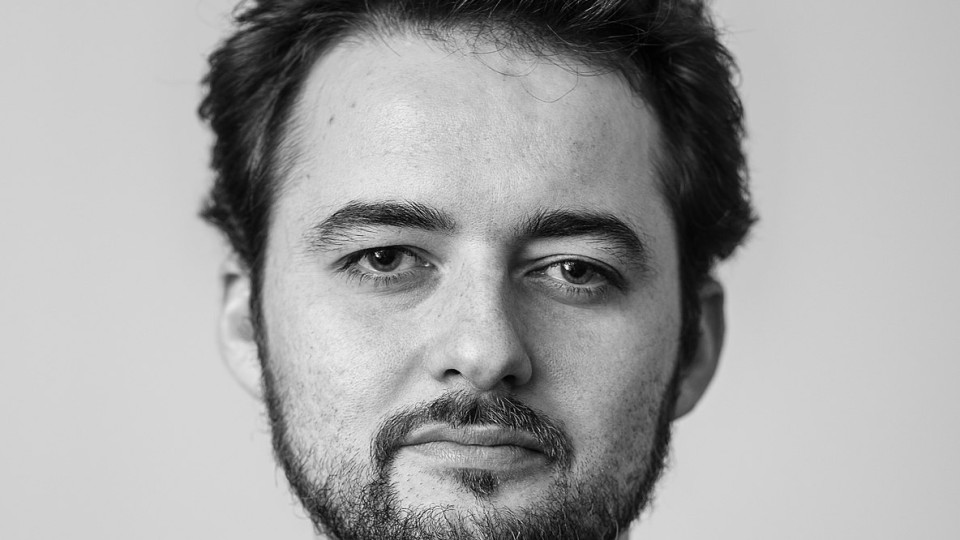Having pen pals was the dating platform of the seventies. At least for Abu Bakr Shawky's parents, who grew closer in an exchange
of fragile airmail letters between Vienna and Cairo. The Egyptian-Austrian filmmaker employs a time frame of approximately
twenty years to study history and stories, especially those of his parents. With political interventions in the background,
the focus is on family legends endlessly revisited and embroidered. Nostalgic in appearance, humorous in tone, THE STORIES is a tragi-comic saga of winning and losing and the wheel of history that keeps on turning.
In THE STORIES you set the story of an Egyptian family in the political context of the period between 1967 and the mid-1980s.
What prompted you to tell a family saga?
ABU BAKR SHAWKY: Initially, I wanted to make a film based on how my parents met. My father is Egyptian, my mother is Austrian, and they were
pen pals. They used to write letters to each other in the 70s, and I thought that was a quite remarkable way for them to meet.
I wanted to make a film about that, but the more I worked on this idea, the more it became a very fictional version of my
parents’ story. I wanted to honor them and their story of getting together, but in making the film I created a fictional version
of it. In addition to their story, I put all the family stories I heard growing up, about uncles, aunts and neighbors, into
the film.
Did you do some sort of research within your family in order find out more in detail?
ABU BAKR SHAWKY: The research was naturally built in, because my Egyptian family used to gather every week to tell and repeat all the stories.
It was very interesting to listen to these stories over and over again. What I noticed was they were very good storytellers;
whenever they would tell the story, it would become bigger. Each new version became more fantastical and bigger, and they
added more drama to it. It seemed interesting to me to turn this into a movie. Movies are by nature a bigger retelling of
an otherwise simple story. I wanted to pay homage to that.
You chose a politically significant period for Egypt as the time frame. Why did you choose to tell the story of these difficult
years by means of comedy, or at least by creating so many funny situations?
ABU BAKR SHAWKY: It wasn’t supposed to be a comedy, and I don’t know if it really is. It’s something that mixes tragedy and comedy together.
Whenever something good happens to the family, something bad also happens. The comedy comes from people being naturally themselves,
being overly dramatic in everything that they do. I saw that a lot growing up with people around me. That’s where the humor
comes from, but it’s not a humor that requires people to laugh out loud; it’s more about people and how they behave, how they
act. I think that on an individual level you’ll find the humor in it, but generally speaking, the story unfolds in a way that
whenever something good happens to the family, something critical or bad happens to their community. And the opposite is also
true. If something bad happens to the family, something really good is happening around them. They live with this constant
dichotomy of joy and misery that always seem exist next to each other. It seems to be part of who they are. At its core, it’s
about a family that never wins. Real life has nothing to do with happy endings; sometimes you have to write a happy ending
into a movie in order to make it like that. If it’s all about a family that never wins, it would be nice to put them in a
situation where they go through all their struggles and finally make victories out of it.
Can you recall for us the key political events of the period covered by this film?
ABU BAKR SHAWKY: THE STORIES follows the period from 1967 to 1984, which is a critical period with a lot of change and turmoil in the country
and in the region. It was a critical time for Egypt; they went through war, massive internal protests and upheavals, price
changes and inflation – really things that would tear many countries apart – and that put a heavy burden on the country. The
film is not really about these events. It’s about the little man, the normal, regular person who lives through the events,
and how they have an effect on people and all their plans. The family is planning for things they’d like to have: Ahmed, the
pianist and main character, always wants to have a concert. Whenever he gets a concert, something bad happens. It’s very often
overlooked how a regular person lives through decisive political events.
You choose several structuring elements: the chapters are linked to a year or to events. A second element is the character
of the TV journalist, through whose career and presence on screen, we witness political changes and also the history of television:
from the not-yet-widespread TV set in homes to the mass media with political influence and then finally a superficial entertainment
medium.
ABU BAKR SHAWKY: This specific TV commentator is obviously a creation of fiction. He is someone who survived through every age and every different
political change. He goes with the flow, he goes with whatever is strongest, with the direction the country is currently taking.
By nature, he is a survivalist. It’s not a criticism of him; it’s more of a necessity of life. That kind of person exists
in every country, and if you look around in the media, you can find him in every community, in every country, in every culture.
I thought it interesting to see the continuity; there’s always a person who goes with the flow, says “yes” to everything and
supports whoever is in power. He considers this a necessary technique to ensure his survival.
At the same time, you paint a picture of an era where TV was the media to reach out to the population. TV as the new mass media after radio.
ABU BAKR SHAWKY: The 60s and 70s specifically were the age of radio and TV. You will notice that in the film there’s always a TV or a radio
on. I remember that growing up in my home. They always had something on in the background. It didn’t have to be anything they
were watching, but it had to be on. There was always a song, a TV show, a presenter; the space was constantly inundated with
that kind of media. In a strange way, it almost forms a background soundtrack. There’s no film music in THE STORIES; it all
comes from sources such as TV or radio, and it somehow creates the soundtrack of our culture, be it music or political commentaries.
The film contains a lot of original TV footage, relating both to political events and football. Can you tell us about the
research and the selection criteria you used?
ABU BAKR SHAWKY: Of course we had a research team who looked through the archives. A lot of the footage in the film comes from things that
I knew growing up. Again: since there was always a TV set on, there were always TV channels showing things. This applies specifically
to the music: I use songs I heard growing up. All the archive footage, such as the powerful images of Nasser resigning or
the assassination of Sadat, is part of our collective memory as Egyptians. They formed a part of our understanding of modern
history. These are very popular things that we saw over and over again growing up. They became part of the movie, because
in a way the movie is a reproduction of my own memory, even though it is fiction. It’s certainly a very personal approach
to fiction, something that captures all the memories and things I heard growing up.
Your characters convey something both stereotypical and at the same time powerfully individual. How did your film family grow
during the writing process?
ABU BAKR SHAWKY: A lot of it is stories that we told ourselves about a distant uncle, about a postman we used to see, about people we kind
of knew but never really knew. The guy with the evil eye is just someone my uncles used to talk about, some person we don’t
know that well. In our story the guy has the evil eye, and he’s responsible whenever something bad happens – but in his own
story he’s actually the reason something good happens; he doesn’t have the evil eye, and people just misunderstand. In his
version of the story, he’s the good guy. I wanted to give respect to the “normal” people, the ones we talk about all the time
but without ever seeing their point of view. I wanted to do justice to these people who, in their personal version of the
story, are the heroes. All these characters are a version of themselves, of how they would have liked to see themselves.
What is particularly impressive about your direction is your sensitivity to emotion in small details. This is evident in the
encounter between families from two cultures and languages, but also in the observation of Ahmed's mother, which gives us
some idea of the burden a woman had to carry in this very normal family. Does that resonate with your approach?
ABU BAKR SHAWKY: Let’s take the example of the mother. Whatever she goes through in terms of this burden is made up for by being the center
of everything, because all these people are nothing without her. When she dies, basically the family dies. Once the mother
passes away, that’s the end of that family. As it becomes clear in the film, she assumes the position of the storyteller of
the family, of the person that safeguards the secrets and the stories of the family by taking notes at night in one of the
very many notebooks she keeps under her bed. She’s the one who actually preserves the stories for generations to come, so
they can learn from her. And in a way that gives her the highest value that anyone could think of, in terms of family.
What inspired the very entertaining scenes about the cultural differences and linguistic misunderstandings between the Austrian
and Egyptian families?
ABU BAKR SHAWKY: I grew up between Egypt and Austria. My grandparents on the Austrian side didn’t speak any English or Arabic; my grandparents
on the Egyptian side didn’t speak any German. But when they got together, they were very good at communicating. I was very
young, but just from seeing them interact. Language can become universal very quickly; people can understand each other very
quickly. The scene on the balcony with the two fathers sitting next to each other; they literally have the tools to communicate
with each other. And it’s the same with the two mothers; they have enough experience in life to get along with each other
without using words. Another point that I noticed growing up is the two things that overlap between Egypt and Austria, despite
all the differences. The tone of voice is a little bit louder, both sides speak a bit louder than people in other countries,
and there’s a lot of energy and animation in their storytelling. When they say something, they are very passionate and intense
about how they say it. That’s an interesting overlap.
Can you tell us about your decisions concerning the visual look of the film? There’s this kind of nostalgic coloring, the
very obvious decision to shoot the square in front of the house in the studio (showing the passing of time by small changes),
and there’s the big gesture of a close-up kiss at the end of the film. Is THE STORIES a tribute to a certain period of Egyptian
cinema?
ABU BAKR SHAWKY: For sure. I was trying to pay homage to the grand Egyptian spectacles of the 1950s and 1960s. Egypt has a very long history
of cinema. The period between 1940 and 1970 really was a golden age. They made grand spectacles, big technicolor movies. The
movies were great, very operatic and cinematic, the music was loud, the energy was high. I wanted to make a sort of tribute
to that, because in a way the film is about that period, but it’s also about decline. I wanted to go back to that era and
see how it’s possible to make a movie with modern tools. I grew up watching movies in the 90s, meaning my cinematic library
is kind of located in the period of the 90s. For me, that’s the peak of very strong auteur filmmaking. If you apply the cinematic
tools of the 90s to stories from the 60s, I wanted to mix these two eras and make a lively, fast paced, loud film that is
interesting and entertaining to watch.
In casting Valerie Pachner you chose one of the most renowned Austrian actresses for the role of Elizabeth. Can you tell us
more about the Egyptian cast?
ABU BAKR SHAKY: I was extremely blessed with the people I worked with during the creation of this movie both in front and behind the camera.
Valerie
Pachner is a wonderful, amazing, very skilled actress. I was very blessed that she said agreed to work on this film. She has
extreme dedication to the work and it was a pleasure to work out every scene with her and watch her embody the character.
It’s the same for the Egyptian cast, these are all very seasoned, very particular, very strong actors. Very active in the
scene here in Egypt, but also very strong character actors. To start with Amir El-Masry who is the main character Ahmed, he
is an extremely well trained as actor. Nelly Karim, who plays the mother, is a super star in the Middle East. In agreeing
to play Fairuz, she took on a role that she would normally not take. She performed a massive transformation on herself to
embody this role with so much dedication, so much devotion. It’s remarkable how she pulled it off. The other actors, Ahmed
Kamal who plays the father, Sherif Desouky who plays the uncle with the evil eye and Sabry Fawwaz, the musician uncle, are
all very strong character actors. They were a joy to work with. They brought a lot of dedication and embodiment, I hope that
they had fun with their role.
Was THE STORIES a different directing experience than your previous films?
ABU BAKR SHAWKY: So far, I would say every film has been a completely different experience, in terms of how you approach the actors, how you
approach people you work with. In my first feature film experience I worked with non-actors, which is a completely different
approach. What I wanted to do in this film was to adhere to the lines in the script but at the same time give my seasoned
actors enough room to interpret and to improvise. We would always do the scene, but we would use the script as the basis of
what the scene should be and give them enough space to kind of have fun with the scene. A major part of the film was to create,
to use the script as the basis for how to start but not as the final word on how it should end. It always became a little
bigger, a little more dramatic, a little more full of effects and things.
You give the impression that the shoot was enjoyable
ABU BAKR SHAWKY: Yes, massively. It was so much fun to do, especially in the scenes with all the family members. These are scenes you’re usually
a little afraid of, because you don’t know where it’s going to go. Over time, the actors got used to me, to the direction
and the tone of the film. Once you have all those actors in the same room, they create something that is so magical. If you
do it right, you don’t really have to give so many instructions anymore, because you let it unfold, you give them the basic
rules of whatever game we’re playing that day and let the scene unfold. They are all seasoned actors and know what to do and
how to get where we need to be. That was the core of the great experience of this shooting.
THE STORIES is an international co-production. What about the Austrian artistic input, apart from Valerie Pachner in one of
the leading roles?
ABU BAKR SHAWKY: THE STORIES is a co-production with coproducers from Egypt, France, Austrian, Belgium and Sweden involved. The shooting took
place between Egypt and Austria. The crew is majority Egyptian with a lot of Austrian elements. We have Maria Hofstätter and
Johannes Krisch as Elizabeth’s parents, as well as Jack Hofer. I was very blessed to work with such a cast, and we were very
lucky to have Wolfgang Thaler as the cinematographer, alongside his assistant Sophia Wiegele. The film relies mostly on handheld
camera and Wolfgang is probably the best handheld camera-operator in the world. He has such a good eye, he’s diligent and
he is a decent human being. The same goes for the producers Alexander Glehr and Johanna Scherz, and their team. It was a very
particular pleasure to work with editor Roland Stöttinger over several months to put this together. In post-production, he
became the powerhouse of the operation, and we spent many weeks going over each scene, as he untangled the mostly improvised
footage created during filming. Without him, it would have been a completely different film. And the same goes for colorists
Andi Winter and Klaus Track, who spent weeks putting together and applying a color palette with meticulous detail.
I’d like to close with the opening of the film. We hear Valerie Pachner’s voiceover, an observation Achmed’s mother had written
in one of her hidden notebooks. She wrote, as she put it herself, about “the things in between”. Something that also refers
to your film, which uses grand gestures but actually tries to depict a lot of things in between.
ABU BAKR SHAWKY: It’s a film about the little victories. There are big things happening in the film, but it’s about little things – your favorite
football team winning a game, your uncle coming over from work for lunch. The things in life that make life worth living.
It’s about the little victories of life.
Interview: Karin Schiefer
November 2025

